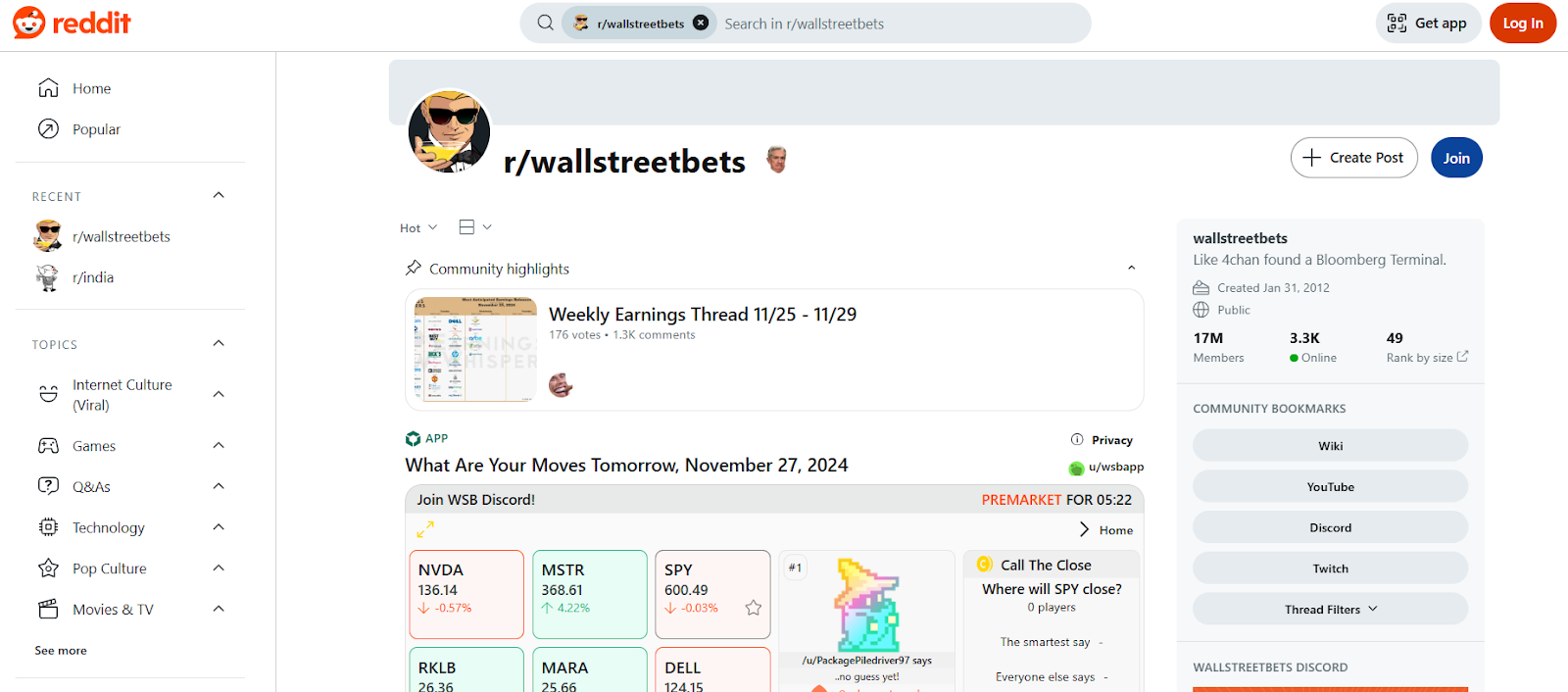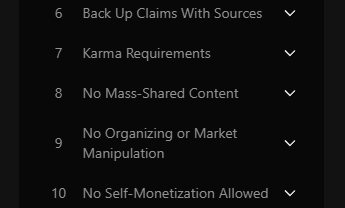A community is a group of people who share common interests or goals and connect to learn, grow, and support each other - online or offline
Key takeaways
- A clear mission statement keeps your community focused and helps attract members who align with your purpose.
- Consumer personas help you identify your ideal audience and guide effective marketing and product decisions.
- Establishing community guidelines and moderation rules from the start prevents toxic behavior and maintains quality engagement.
A community is a group of people who share common interests, goals, or experiences - coming together to connect, interact, and build relationships. Online communities make that connection possible anywhere, helping people learn new skills, grow their businesses, find support, or simply meet others who understand them.
77% of internet users participate in online communities, and that number keeps growing. Whether it's Discord servers, Reddit threads, or dedicated platforms like Whop, these digital gathering spaces have become the new town squares
In this guide, I'll show you what online communities are, why they matter, and exactly how to start your own.
What is an online community?
An online community is a space where people with shared interests, goals, or experiences come together to connect and interact digitally.
These groups exist on platforms like Whop, Discord, Reddit, Facebook, or dedicated community sites - giving members a place to share knowledge, ask questions, and build meaningful relationships no matter where they live.
At its core, an online community helps people feel a sense of belonging. Members often form their own culture, values, and inside language through regular interaction.
The strongest communities are built on consistent engagement, mutual support, and collaboration, whether that’s swapping advice, celebrating wins, or solving problems together.

Whop is the home of online communities. Creating a community on Whop is easy, and the platform offers features specifically designed for community management, like member authentication, chat channels, forums, access control, and more. Intrigued?
Check out this step-by-step guide to build an online community on Whop.
Types of online communities
Online communities can be focused on education, brands, profession, action, niche interest, location, and more.
Let's take a look at the most popular types of online community,
Learning community
A learning community brings together people with shared learning goals. It complements digital products like online courses by facilitating social learning and peer-to-peer support.

If you sell online courses, setting up an online community alongside makes total sense. It's a way to pick up valuable information from your community members, understand what they want, and develop more advanced courses or other digital products suited to their needs.
With Whop's communities (aka 'whops') you can learn anything from cryptocurrency to day trading, selling craft, and more.
Brand community
Brand communities are typically made up of customers, partners, and employees. They are set up by brands to enhance stakeholders’ connection with the brand and offer a forum for support.
Customers receive support from these communities and feel gratified that their voice is heard. As a brand owner, a dedicated brand community gives you deeper insights into your customers’ mindset.
After all, customer retention is the name of the game. And, engaged, satisfied customers in your brand community are the best brand evangelists.
Niche interest based community
Many online communities are formed around a common interest, hobby, or passion. It's true that these communities tend to be quite niche, however, these interest-based communities are often all about bringing together people who go against the grain.

One example is the Pop Mart Labubu Wonderland community, which connects people who collect Labubu dolls.
Action community
Action communities are formed to create social or political change. They range from decentralized hacktivist collectives like Anonymous, to large-scale social justice movements like Black Lives Matter, to grassroots organizing efforts like March For Our Lives and Fridays For Future.
Some action communities focus on specific causes - for example, r/WallStreetBets mobilized retail investors to challenge traditional financial power structures, while mutual aid networks coordinate community support and resources.

What unites these diverse groups is their use of online platforms and social media to organize, spread awareness, and drive real-world action toward their objectives.
Geographical communities
There are plenty of online communities focused around different places. If you're planning a trip to a particular region, you might look for online communities that offer travel tips, teach the local language, or tell travelers about the best hangouts in the area.
Profession or practice based communities
These communities are typically set up by members of a certain profession: cryptocurrency, investing, or sports betting are some examples.
The image below shows some of the Airbnb communities on Whop.

They are extremely popular as a way to network within an industry, work towards the profession's development, and learn from each other.
3 online community examples
Now that you know what online communities are and how they work, let's take a look at three examples of communities on Whop.
1. Wealth Group

Wealth Group is the world's leading cryptocurrency trading and educational community that offers community members the opportunity to join and learn from the top trading experts in the field.
The Wealth Group community educates its members on everything from trading signals, to meme coins, risk management and portfolio management. With daily livestreams and exciting networking opportunities, Wealth Group has created a thriving online community.
2. Cook Along with VIP Seasonings

This online community is one for the foodies. Cook Along with VIP Seasonings teaches its members how to cook with 'VIP Seasonings'.
Members of this community get access to live cooking sessions, exclusive vlogs, recipe cards, and even monthly VIP boxes with seasonings to use in their next cooking session.
3. Highest Paid Nurse Community

The Highest Paid Nurse Community teaches nurses of all kinds how to make more money in their chosen career path. Here, nurses come together for guidance, career advice, resources and job opportunities.
Creating your own online community
Perhaps you want to start your own online community - here's how you can do it.
After you're done, make sure to check out our article on what an online community manager from our team has learned after managing a server with over 6,000 members thinks the top 7 lessons every community manager should know.
1. Define your online community’s purpose
You’ve already thought about why you’re setting up your community. Now it’s time to refine those ideas and formalize your goals. A mission statement can remind you of why you’re doing it, any time you feel overwhelmed. It also lets members know the purpose of the group.
A mission statement like “teaching new traders a solid trading system to help them earn a living from home” is basic but so powerful.
It communicates the purpose of the group in a single, neat line while highlighting what members can expect to get from being a part of the community.

The businesses above on Whop ensure their purpose is clearly visible, even in a limited thumbnail view. They advertise benefits like “become an extraordinary trader”, and "join and snipe trades with confidence".
The bottom line is, a clearly expressed community purpose helps ensure it stays on track as time goes on, while giving members a definite idea of why they should join.
2. Identify your target audience
Create a ‘consumer persona’ to accurately define your core community member. This means looking at demographics (where they live, their age, earnings), behavioral aspects (attitudes, habits, personality type) and more.
Consumer research helps you market to your ideal customer via the most effective channels while meeting their product development needs. The insights you can gain by studying your ideal audience can help you make important future decisions.
3. Outline your community structure
What do you want your community structure to look like? Every group needs structure to work.
Whether it’s a round table-like structure that Mastermind groups typically use or a more traditional hierarchical setup, what’s important is that you define this structure.
You'll also need to think about customer support when issues with your products or the community crop up (Whop can help you with this!).
Finally, consider whether you want to involve any of your other stakeholders in your community. For example, if you're running a brand community, the product development folks should be directly interacting with customers to get feedback.
4. Set out guidelines and rules
Let’s put this plainly—people can, sometimes, behave quite badly.
We’ve all seen this in everyday life. And if people can’t stay on their best behavior in the real world, those tendencies blow up when they’re behind a screen and the relative anonymity of an online handle.
Here’s where rules and guidelines help - along with moderators to enforce them.

Most groups have rules similar to the one above to ensure members adhere to at least a basic standard of decency.

Rules like the ones shown above are taken from one of Reddit’s top finance subs r/Superstonk; these are more specific to the niche, content quality, and chosen platform.
5. Choose a community platform
Whop is the best platform for building an online community because it gives you complete control over how you grow, manage, and monetize your members.
It’s free to use, and you only pay a small fee when someone purchases your product, joins your membership, or subscribes to your offer - meaning you keep ownership of your audience and your revenue.

Unlike third-party platforms such as Discord, Reddit, or Telegram, Whop doesn’t impose outside rules, ads, or distractions. You won’t risk being deplatformed or having competitors’ communities promoted alongside your own.
While platforms like Facebook Groups or LinkedIn can work for specific audiences, they ultimately control the experience, not you.
With Whop, your community lives entirely on your terms, in one place where you can engage members, sell offers, and build something that lasts.
6. Set up your online community
Whop is an outstanding online community platform, so we’ll show you exactly how to get started here.
To get started, to have to create a whop. A whop is the home of your online business - or in this case, your online community.
Once you’re on the onboarding page, you’ll complete five quick steps:
- Choose your business model (paid group)
- Select your industry
- Share how you plan to use Whop
- Pick your country
- Enter your community name
After that, you’ll be guided through creating your whop.
What’s next?
After creating your whop, it’s time to set up your community. There are two main things left for you to do: add apps and configure your store page.
- Add apps : Apps make your whop a usable platform and not just an empty space.
You should take a look at every single app that is available on the Whop App Store and decide which ones your community needs. At the very least you will need the 'chat' app.
For more information on adding apps to your whop, read our 'how to add apps to a whop' guide. - Set up store page: After you’re all done with apps, it’s time to set up your whop's store page - aka the public page of your community.
By setting up your store page, you can share information about your community, the apps it uses, and basically everything a potential member needs to see to be able to decide if they want to be a part of your whop or not. It's also required to list your community on Discover.
7. Begin your marketing campaign
While you get the building blocks of your online community, putting your marketing plans in motion is equally important. What’s the point if, after all your effort, people don’t know that your community exists!
Do you have a social media presence and a bunch of followers? That makes things even easier. Start in advance, get the word out and start building up awareness of your community. Get some hype out there.
You’ll also get lots of feedback at this stage which could inform critical decisions (such as what features to include).
Keep accelerating your marketing, especially close to the launch date. Your audience needs to know what’s coming. Incentivize them to spread the word. You'll win big if your customers or followers spread the word through their social networks.
8. Launch your community
Don't do what the next person is doing just because it's working for them. You have your own unique set of experiences and personality that's designed to inspire and help a specific group of people out there in the universe.
Remember: building a community starts by providing value first.
– Jordan Kilgour from XFACTR
It’s time to open your community door. And, there are a few different ways to do this.
Communities run by mature businesses often go for a soft launch to control some of the metrics and work out the kinks before a full public launch.
Interested in a soft launch? Try opening up to internal stakeholders such as members of your team or a few trusted friends and associates.
Going public means you need to be everywhere at once. Think about a musician releasing a new album, or actors when a movie comes out. They're on every chat show and magazine they can get. You should be doing the online equivalent of that by starting a discourse around your business and community wherever you can.
9. Adjust, adapt and keep growing
Staying flexible and adaptable is essential when you’re running an online community. There are so many variables, members joining and leaving constantly and unforeseen challenges despite the most thorough plans.
Community members’ feedback is your best indicator of how things are going. Interacting with them will let you make the little adjustments and tweaks necessary to keep up the morale and community engagement levels.
A toxic atmosphere and declining participation can quickly destroy a community, so it's crucial to actively monitor and stay on top of things.
Diving into analytics is another essential piece of keeping your community thriving, and having the right platform in your corner makes all the difference.
Platforms like Whop put powerful data at your fingertips, showing you exactly what's working and what isn't so you can keep your members engaged for the long run.
Whop: the home of online communities
Whether you’re joining an online community or creating your own, Whop is the place to do it.
If you’re looking to find your people, Whop is home to thousands of active communities across every niche - from trading and sports betting to fitness, cooking, travel, and more. Whatever you’re into, you’ll find a community that fits.
If you’re ready to launch your own, Whop gives you everything you need to build, grow, and manage your community in one place.
You can sell memberships, share premium content like files and courses, host events and giveaways, and keep your members engaged through built-in integrations and tools that make community management simple and effective.



